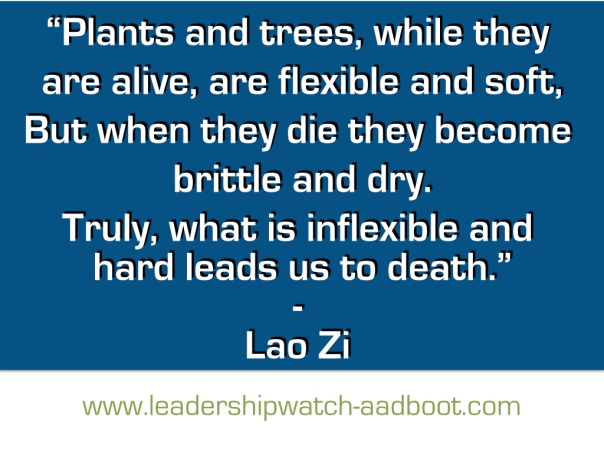What ancient Chinese wisdom teaches today’s leaders in times of complex change.
“Lao Zi was a native of Chu, a southern state in the Zhou dynasty. His surname was Li; his given name was Er, and he was also called Dan. … Lao Zi cultivated Dao and virtue. His learning was devoted to self-effacement and not having fame. He lived in Zhou for a long time; then witnessed the decline of Zhou and departed. When he reached the northwest border, he met the guard Yin Xi, who asked him to put his teachings into writing. The result was a book consisting of 5000 Chinese characters … Thereafter, Lao Zi disappeared; no one knew where he had gone.” (Source: Sima Qian, Biography of Lao Zi, 100 BCE)
The other day I read that business leaders are obsessed with Sun Tzu’s Art of War. It made me wonder: how many leaders know Lao Zi’s short book – commonly called the Dao de Jing or simply: the Laozi (老子). It’s 2400 years old, and easily the best book I have read this summer.
Are you looking for fresh insights on how to lead and deal with complex change, or just interested in ancient Chinese thinking?
What words of wisdom could China’s Lao Zi (The name Lao Zi is best taken to mean Old (Lao) Master (Zi)) possibly have for you today?
How about these:
Change is the new normal
Or better put: change is nothing new. The way of the Universe, the Old Master says, is change:
“Difficult and easy complete one another.
Long and short test one another;
High and low determine one another.
Pitch and mode give harmony to one another.” (Laozi 2)
Stay flexible
If you stay flexible you are well equipped to lead and deal with complex change:
“Plants and trees, while they are alive, are flexible and soft,
But when they die they become brittle and dry.
Truly, what is inflexible and hard leads us to death.
Flexibility and softness are friends of life.” (Laozi 76)
Be observant
“To know when one does not know is best.
To think one knows when one does not know is a dire disease.” (Laozi 71)
Be observant. Become a better listener (read a few tips here). Take the time to understand what is behind unfamiliar behavior before making up your mind and voicing your opinion. Particularly in cross-cultural business situations (read more about cross-cultural differences in teams).
Cultivate your inner strength
“To be like water, that’s the highest.
Water benefits all creatures; yet itself does not compete.” (Laozi 8)
Last but not least: watch your health
“Fame or your own body: which matters to you most?
Your possessions or your health: what is worth to you most?” (Laozi 44)
But how to take care of your health when you are swamped with work and pressed for time already? Here’s what Lao Zi shares in that other delightful book of Taoism, the Zhuangzi:
“These are the rules for staying healthy:
Can you embrace the One? And never lose it?
Can you, without consulting oracles, foretell fortune and misfortune?
Do you know where to stop? Do you know where to let go?
How to not put the blame on others but instead look inside yourself?
Can you be unbridled?
Can you be unsophisticated?
Can you be a like a baby? A baby can howl all day, yet its throat never gets hoarse – harmony at its height! A baby can clench its little fists all day, yet its fingers never get cramped – so perfect is its inner strength! A baby can stare all day without once blinking its eyes – so little affected it is by things that do not matter.
To move without knowing where you are going, to stand without knowing why, flexibly trailing about with things, and riding along with them on the same wave – These are the rules for staying healthy.” (Zhuangzi 23:1)
Lao Zi, legend has it, lived to be 160. Should you now decide to print his words and hang them on your mirror: know that I have done the same.
What reflections or thoughts do you have after reading this? Let us know!
Join us and register at the top of this page to stay up to date with LeadershipWatch articles and news. Your personal information will be kept strictly confidential.
Photo: DonkeyHotey/Flickr (Creative Commons)
 This article is part of our Expert Series in which Hanneke Siebelink shares valuable leadership lessons from a list of experts, researchers and role models she selected. The LaoZi is among the most loved and translated works in world literature. Arthur Waley’s translation into English (1934) is excellent. For Dutch readers we highly recommend Kristofer Schipper’s translation into Dutch (2010).
This article is part of our Expert Series in which Hanneke Siebelink shares valuable leadership lessons from a list of experts, researchers and role models she selected. The LaoZi is among the most loved and translated works in world literature. Arthur Waley’s translation into English (1934) is excellent. For Dutch readers we highly recommend Kristofer Schipper’s translation into Dutch (2010).
 Hanneke Siebelink is Research Partner and Writer at HRS Business Transformation Services, and author of several books. Her current research focuses on how leaders build successful organizations by increasing the quality and effectiveness of collaboration across companies, functions, and cultures. She is particularly interested in China and East-West relations and is learning Mandarin Chinese. Find out more about Hanneke and HRS services. If you would like to invite us to your organization, contact us here.
Hanneke Siebelink is Research Partner and Writer at HRS Business Transformation Services, and author of several books. Her current research focuses on how leaders build successful organizations by increasing the quality and effectiveness of collaboration across companies, functions, and cultures. She is particularly interested in China and East-West relations and is learning Mandarin Chinese. Find out more about Hanneke and HRS services. If you would like to invite us to your organization, contact us here.














Reblogged this on Gr8fullsoul.
LikeLike